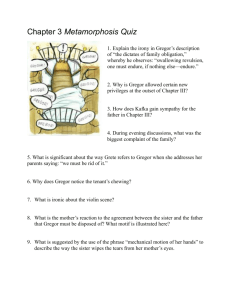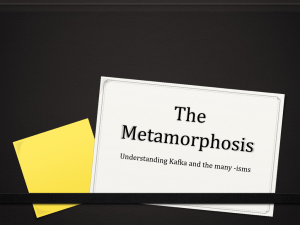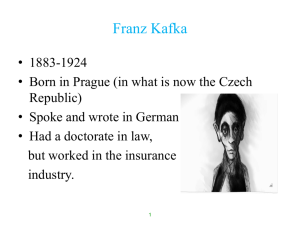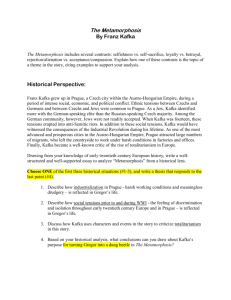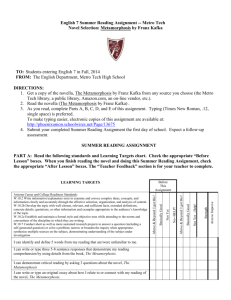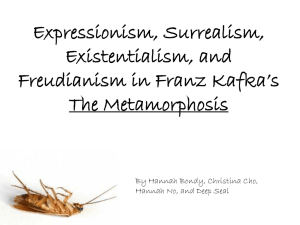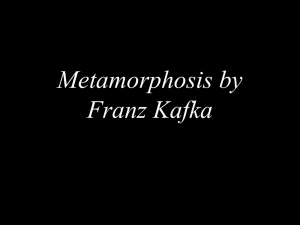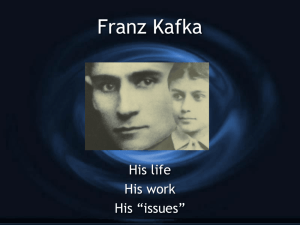The Metamorphosis
advertisement
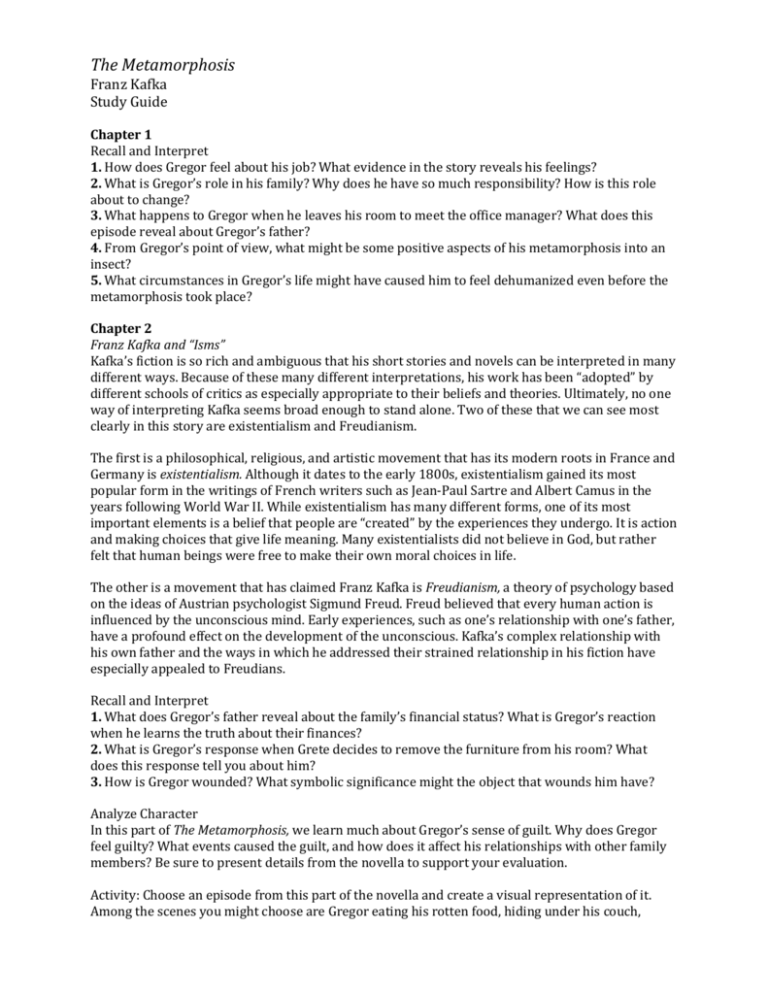
The Metamorphosis Franz Kafka Study Guide Chapter 1 Recall and Interpret 1. How does Gregor feel about his job? What evidence in the story reveals his feelings? 2. What is Gregor’s role in his family? Why does he have so much responsibility? How is this role about to change? 3. What happens to Gregor when he leaves his room to meet the office manager? What does this episode reveal about Gregor’s father? 4. From Gregor’s point of view, what might be some positive aspects of his metamorphosis into an insect? 5. What circumstances in Gregor’s life might have caused him to feel dehumanized even before the metamorphosis took place? Chapter 2 Franz Kafka and “Isms” Kafka’s fiction is so rich and ambiguous that his short stories and novels can be interpreted in many different ways. Because of these many different interpretations, his work has been “adopted” by different schools of critics as especially appropriate to their beliefs and theories. Ultimately, no one way of interpreting Kafka seems broad enough to stand alone. Two of these that we can see most clearly in this story are existentialism and Freudianism. The first is a philosophical, religious, and artistic movement that has its modern roots in France and Germany is existentialism. Although it dates to the early 1800s, existentialism gained its most popular form in the writings of French writers such as Jean-Paul Sartre and Albert Camus in the years following World War II. While existentialism has many different forms, one of its most important elements is a belief that people are “created” by the experiences they undergo. It is action and making choices that give life meaning. Many existentialists did not believe in God, but rather felt that human beings were free to make their own moral choices in life. The other is a movement that has claimed Franz Kafka is Freudianism, a theory of psychology based on the ideas of Austrian psychologist Sigmund Freud. Freud believed that every human action is influenced by the unconscious mind. Early experiences, such as one’s relationship with one’s father, have a profound effect on the development of the unconscious. Kafka’s complex relationship with his own father and the ways in which he addressed their strained relationship in his fiction have especially appealed to Freudians. Recall and Interpret 1. What does Gregor’s father reveal about the family’s financial status? What is Gregor’s reaction when he learns the truth about their finances? 2. What is Gregor’s response when Grete decides to remove the furniture from his room? What does this response tell you about him? 3. How is Gregor wounded? What symbolic significance might the object that wounds him have? Analyze Character In this part of The Metamorphosis, we learn much about Gregor’s sense of guilt. Why does Gregor feel guilty? What events caused the guilt, and how does it affect his relationships with other family members? Be sure to present details from the novella to support your evaluation. Activity: Choose an episode from this part of the novella and create a visual representation of it. Among the scenes you might choose are Gregor eating his rotten food, hiding under his couch, listening at the door or looking out the window, hanging from the ceiling, clutching his picture, or fleeing from his father’s attack. Include 2-3 lines of the text to support the details in your picture. Chapter 3 Fathers and Sons One figure looms over The Metamorphosis, especially in the third chapter. Many critics believe that the commanding figure of Mr. Samsa is the literary personification of the real-life figure who dominated Franz Kafka’s life—his father, Hermann Kafka. Hermann Kafka was in many ways the exact opposite of his slender, shy, and thoughtful son: large, authoritarian, forceful, gruff, obsessed with his clothing business, and emotionally distant. The father also scoffed at his son’s interest in literature and helped end his engagement to a woman from a socially inferior family. In a famous letter to his father, written in 1919 but never delivered, Franz Kafka discusses their relationship. He claims that he felt as though he could not possibly live up to his father’s expectations of him. As you read this section of the novella, think about how the relationship between Kafka and his father might have influenced Kafka’s portrayal of the father and son in The Metamorphosis. Recall and Interpret 1. Why, do you think, has Grete’s attitude toward Gregor changed? 2. Who comes to live with the Samsas? What might be the significance of these new characters? 3. How does Gregor respond to his sister’s violin playing? What might Kafka be implying about Gregor by describing this reaction? 4. The narrator strongly implies that Gregor starves himself to death. What other forces might have led to Gregor’s death? 5. What effect does Gregor’s metamorphosis ultimately have on his family? What does this effect suggest about his relationship with his family? Analyze Meaning The word translated as vermin in the first sentence of The Metamorphosis is Ungeziefer in the original German. As Kafka probably knew, Ungeziefer derives from a Middle High German word meaning “an unclean animal not suited for sacrifice.” What meaning do you think this word conveys about the nature of Gregor’s metamorphosis? Do you think that his death can be seen as a sacrifice in any sense? Explain why or why not.
